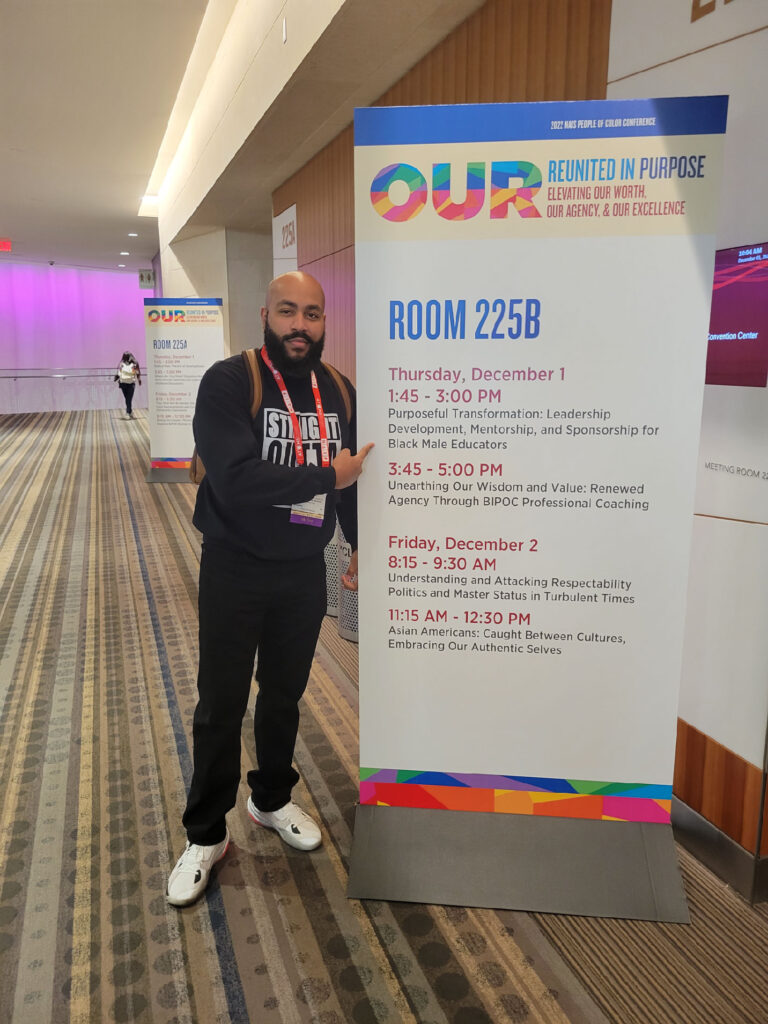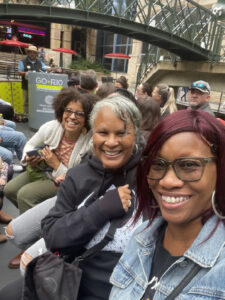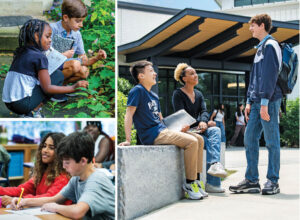At AFS, faculty and staff are encouraged to attend and participate in pedagogical conferences across the United States. Last week, a group from AFS’ professional community traveled to San Antonio, Texas to participate in the NAIS People of Color Conference, which provides a space for “leadership, professional development, and networking for people of color and allies of all backgrounds in independent schools.” The group contained educators from across every division at AFS and included faculty and staff alike.
“I found the entire experience at the People of Color Conference this year to be very much needed,” says Lisa Kurtz, Assistant Director of Athletics and Department Chair Health/Wellness and Physical Education. “To have close to 8,000 Independent School Educators present was awesome. This was only my 5th PoCC, so I cherished this opportunity. My colleagues are amazing and my wish would be that more can attend in the future conferences.”
In contrast, this was Middle School Administrative Lead Crystal Castle’s first time at the conference. “I wasn’t sure what the experience would look like, but I’m happy to say it was an excellent experience,” says Crystal. “The workshops were awe-inspiring and thought-provoking. The speakers were dynamic and left me feeling invigorated.”
 Mikael Yisrael, AFS’s Director of Equity, Justice, and Engagement, himself developed and presented two workshops during the conference. The first, “Begin Again: (Re)Developing Community and (Re)Designing for Equity through Healing,” looked at the joint processes of harm and healing in school communities through the lens of liberatory design, a creative problem-solving approach and practice that centers equity. By placing attention on one’s mindsets — which invoke stances and values to ground and focus our design practice — and modes — which provide process guidance for our design practice — liberatory design “generates self-awareness to liberate designers from habits that perpetuate inequity, shifts the relationship between the people who hold power to design and those impacted, fosters learning and agency for those involved in and influenced by the design work, and creates conditions for collective liberation.”
Mikael Yisrael, AFS’s Director of Equity, Justice, and Engagement, himself developed and presented two workshops during the conference. The first, “Begin Again: (Re)Developing Community and (Re)Designing for Equity through Healing,” looked at the joint processes of harm and healing in school communities through the lens of liberatory design, a creative problem-solving approach and practice that centers equity. By placing attention on one’s mindsets — which invoke stances and values to ground and focus our design practice — and modes — which provide process guidance for our design practice — liberatory design “generates self-awareness to liberate designers from habits that perpetuate inequity, shifts the relationship between the people who hold power to design and those impacted, fosters learning and agency for those involved in and influenced by the design work, and creates conditions for collective liberation.”
Explaining the heart of the workshop, Mikael writes, “While it can be easy to fall into a state of learned helplessness or difficult to find joy in the midst of pain, as educators, we are called to be sources of light even during the darkest of times.”
His second workshop, titled “Purposeful Transformation: Leadership Development, Mentorship, and Sponsorship for Black Male Educators,” discussing disparities in the U.S. teaching population and the critical importance of having Black male educators in classrooms.
 This is an issue that has long been highlighted. “According to the Stanford Graduate School of Education, only 2 percent of America’s teachers are Black men,” writes professor and poet Sundjata Sekou for the National Education Association. “This issue of Black men not being teachers in the classroom affects every student, but it affects Black boys disproportionately.” Moreover, Mikael highlights the importance for Black male educators to be properly equipped with the ability to teach using culturally relevant pedagogy.
This is an issue that has long been highlighted. “According to the Stanford Graduate School of Education, only 2 percent of America’s teachers are Black men,” writes professor and poet Sundjata Sekou for the National Education Association. “This issue of Black men not being teachers in the classroom affects every student, but it affects Black boys disproportionately.” Moreover, Mikael highlights the importance for Black male educators to be properly equipped with the ability to teach using culturally relevant pedagogy.
Reflecting on the other workshops she attended, Lisa found a few of them to be especially insightful: there was one highlighting the importance of peer-to-peer oral histories and another challenging the ongoing dominant narrative on critical race theory. But she also thought the experience itself was a much needed breath of fresh air — both to be back in person and to reunite with fellow educators from across the U.S. whom she had not seen in years.
“The 2022 NAIS/PoCC was the first in-person event since 2019,” says Lisa. “I truly felt honored to represent AFS in each workshop, and for that matter, the general sessions that I attended. What resonated with me was the commitment by so many BIPOC and white identifying educators to engage in the work of creating, collaborating and uplifting colleagues and students alike. All for the shared purpose of, borrowing the NAIS/PoCC theme for the 2022 event, ‘Reuniting in our purpose, Elevating our worth, Our agency and Our excellence.'”
As an independent Quaker school, we share in the wisdom of José Luis Vilson, a featured speaker at PoCC and the executive director of EduColor, that “We have an obligation to share what we’ve learned with each other because, otherwise, we end up learning in ways that keep us further from our most authentic lessons.”

